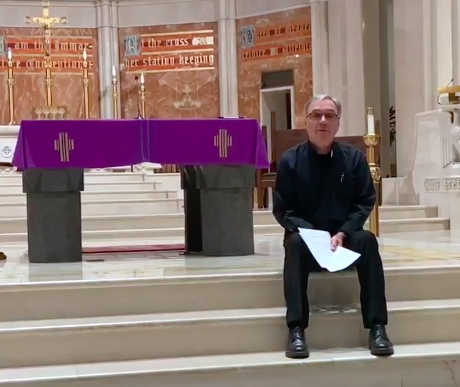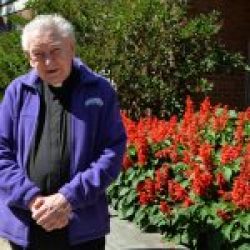Msgr. Neal E. Quartier, rector of Syracuse’s Cathedral of the Immaculate Conception, delivers a video message to the faithful March 19. (screengrab from facebook.com/cathedralsyracuse)
By Renée K. Gadoua | Contributing writer
As the coronavirus pandemic upends routines a few weeks before Easter, the central message of Christianity offers comfort for people of faith.
“We could say it’s our Good Friday. We’re a people of hope and we know Sunday will come,” said Msgr. Neal E. Quartier, rector of Syracuse’s Cathedral of the Immaculate Conception. “I believe good will come from this. God will come. It’s through suffering that Jesus came.”
Quartier has been preaching precaution and patience for weeks, reminding worshipers to take care of themselves and be respectful of others. Not attending Mass “will be painful,” he said, adding, “It may help us appreciate the Eucharist more.”
Watch a video message from Msgr. Quartier below.
Bishop Douglas J. Lucia Monday suspended all public gatherings in the Diocese of Syracuse for Mass, prayer, Faith Formation, and certain parish activities.
All eight New York dioceses had suspended public Masses by Tuesday morning.
With events canceled and schools, businesses, and services closed or limited, people will need patience to navigate uncertain times. When Msgr. Quartier went to Wegmans early Saturday, “it was packed.”
People rushed to buy food and supplies as many families made plans to be home from school and work for at least two weeks to avoid spreading the novel coronavirus, which causes COVID-19. The disease has spread across the globe in recent months, with alarming increases of cases in the United States last week.
“We are learning how dependent we are on God and each other,” Msgr. Quartier said. “We have to be more caring and respectful of each other, no matter who it is. It’s been a tough time in our nation and our church. This is a time to slow down and ask important questions and come together.”
Be prepared for sacrifices and difficult choices, he added. Worshipers will have to learn spiritual practices without in-person community and many will tackle unfamiliar technology for online services. Pastors and caregivers will likely have to limit ministry and interactions with people to reduce spreading the virus.
Msgr. Quartier, a psychotherapist, suggests people limit news consumption to reduce anxiety, stick with trusted information sources, and watch out for hucksters. “We have to follow the advice of the CDC and the right people,” he said. “Our leaders are not doctors or scientists. Don’t fall for all the people who are trying to make money from this.”
Bishop Borys Gudziak, a Syracuse native who is spiritual leader of the Ukrainian Catholic Archeparchy of Philadelphia, urged people in a video message to “be careful and follow guidance of medical authorities.”
Bishop Gudziak grew up in Syracuse, where his family attended St. John the Baptist Ukrainian Catholic Church on Syracuse’s West Side. He also sees hunkering down at home as an opportunity for believers.
“It is an opportunity for us to read the signs that the Lord sends,” he said in the video. “At the same time, our chance for contemplation, for listening, for thought, for reading and especially for prayer, are growing. Make use of this opportunity. Make it an opportunity.”
He urged people to “not let fear or sadness settle into your heart.” Instead, he said, “This is a chance to find in our hearts, in our thoughts, in our conversations, in our emotions, room for the Lord.”
Sickness and death from COVID-19 remind Catholics of their weakness, he said. “We see how weak we are,” he noted. “We see how tender and fragile life is. It’s a gift and it’s given by God in his goodness. He will not leave us alone.”
In addition to 114 parishes, the Syracuse Diocese operates six Catholic Charities agencies with dozens of programs that serve more than 100,000 people a year. Michael Melara, diocesan Catholic Charities CEO and executive director of the Onondaga County agency, urges the agencies’ nearly 1,600 employees to resist panic and fear as they serve people during this global public health crisis.
“As an organization we’re not immune to the concerns and threats that affect the people we serve,” he said. “At the same time, we must be intentional, thoughtful, and proactive in our attempts to prevent spreading the disease.”
The pandemic will affect nearly every aspect of life, with new disease data and updated policies announced multiple times a day. “It’s going to create anxiety,” Msgr. Quartier said. “It’s part of the ambiguity of life. We are given grace to meet this challenge.”
Learning that people have little control over their lives “should bring us closer to God,” he said. “This is a real wakeup call for us. Don’t trust human beings. Trust God. We can’t place all of our trust in politicians or the stock market or money. Those things don’t last.”
Some countries, including the Vatican, are on lockdown and people all over the world are urged to practice social distancing. The slower, quieter and more isolated life the pandemic allows people to think about Lent, the solemn, reflective period that precedes the resurrection of Jesus Christ.
“What is God saying to us?” Msgr. Quartier said. “Perhaps as Christians and a nation we haven’t paid a lot of attention to Lent. Well, here it is. We can enter into it and become stronger as a result.”
Renée K. Gadoua is a freelance writer and editor. Follow her on Twitter @ReneeKGadoua.






